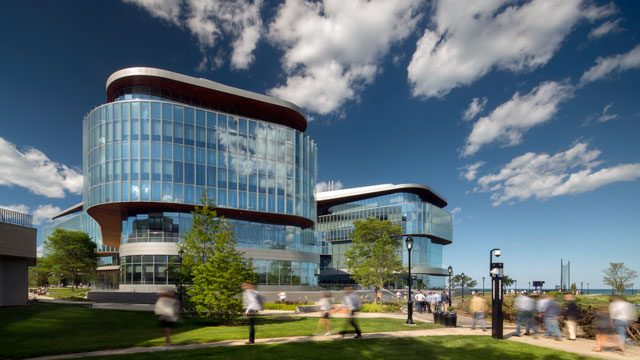Northwestern University’s Kellogg School of Management will host ClimateCAP: The Global MBA Summit on Climate, Capital & Business in spring 2022. This annual summit, in partnership with business-school programs across the globe, brings together students and leaders across industries to discuss business engagement with issues of climate change.
ClimateCAP originated at Duke University’s Fuqua School of Business in response to a growing appetite from MBA students to be better equipped to understand business risks and opportunities related to climate change. The first summit was hosted by Fuqua in 2018.
“We’re so excited for Kellogg to host, as Kellogg has been a partner school for ClimateCAP since the beginning and has a long track record of social impact,” says Katie Kross, managing director of Fuqua’s Center for Energy, Development and the Global Environment.
At the intersection of sustainability and management
Kellogg’s commitment to social impact and sustainability is reflected in its curriculum, programming and global partnerships, including the Impact & Sustainable Finance Faculty Consortium, the Kellogg-Morgan Stanley Sustainable Investing Challenge, the Energy & Sustainability Pathway and Kellogg’s hosting of the Moskowitz Prize, the premier global prize for research in sustainable finance.
“At Kellogg, we think it’s critically important to be preparing the next generation of leaders to lead within the context that faces them,” says Megan Kashner, Kellogg’s director of social impact. “Providing students with tools and frameworks prepares them to address the hard questions that exist at the intersection of sustainability and management. Everyone in business leadership from this moment forward will be looking at climate change, climate justice, climate mitigation — all of it.”
There is a strong interest in sustainability among Kellogg students, 80% of whom take at least one social impact elective during their time at Kellogg according to Kashner. Haerim Hong ’21, the co-president of the Energy & Sustainability Club at Kellogg, is one such student. She attended ClimateCAP in her first year at Kellogg and then took the initiative for Kellogg to host the summit.
Setting examples, leading conversations
“After attending ClimateCAP,” Hong says, “I felt extremely motivated by the experience and knew that I could make an impact on sustainability no matter the industry or function I pursued. I also knew that Kellogg should host — setting examples and leading conversations.”
Hong partnered with fellow student, Aarushi Magan ’21, vice president of Kellogg’s Energy & Sustainability Club, to build a business case for Kellogg to host the conference. After engaging Kashner and fellow faculty member Klaus Weber, the Thomas G. Ayers chair in energy resource management, they pitched the hosting opportunity to Dean Francesca Cornelli.
“When it was brought to my attention that we had the chance to bring ClimateCAP to Kellogg,” Cornelli says, “I had no doubt in my mind that we should be the next host. Climate change and sustainability impact every function and industry, requiring international participation and innovation. This kind of global collaboration is who we are at Kellogg, and I’m so proud of our students and faculty for continuing to advance such an important area.”
For Kashner, hosting ClimateCAP aligns with Kellogg’s culture and advancing the field of sustainability. “It’s really within Kellogg’s identity and ethos to work collaboratively and to create a big tent. In this big tent, we all need to move forward on climate action, climate change, on issues of climate justice, and for Kellogg, it’s part of who we are in wanting to bring the field forward.”
For Weber, hosting aligns with Kellogg’s education model. “The summit reflects how we look at business education. It has to integrate public policy issues and it has to integrate broader impact and responsibility for the world,” Weber says.
While Kellogg is early in the process of its planning for the summit, it has already identified one variation in its design of the summit, which Weber believes will contribute to the school’s field-building in sustainability.
“We will put an emphasis on climate justice, including the relationship between the global south and developed countries and climate action, as well as racial equity,” Weber says. “By bringing the inequities and inequalities into the conversation on climate change, we will think about climate change from a more holistic point of view.”
Emma Stanton is a content strategist at Kellogg.


